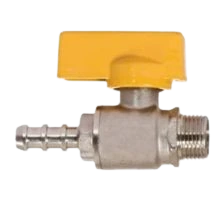Get A Quote
BIS Certification for Valve Fittings for LPG Cylinders Above 5 Litres IS 8737:2017

Valve fittings are the most critical
components of LPG cylinders. They control the flow of gas, ensure safety during
use, and prevent gas leaks or pressure-related accidents. In India, for LPG cylinders with a water capacity
exceeding 5 litres, the Bureau of
Indian Standards (BIS) mandates compliance with IS 8737:2017, a standard that ensures the performance, safety, and
durability of valve fittings used in such cylinders.
This certification is not merely a regulatory formality—it is a necessary safety mechanism. LPG is a highly flammable fuel, and any failure in the valve system could result in serious fire hazards, explosions, or toxic exposure. Hence, the quality of valve fittings, particularly those used in high-pressure environments, is stringently regulated by BIS through this standard.
Importance of IS 8737:2017
for LPG Valve Fittings
IS 8737:2017 lays down the
specifications for valve fittings used in LPG cylinders exceeding 5 litres of
water capacity, commonly used in domestic, commercial, and industrial sectors.
These valves are responsible for safe filling, storage, and regulated
withdrawal of gas. The standard outlines all aspects of design and performance,
right from the materials used, structural design, and valve stem threading, to
pressure-bearing capabilities, durability, and resistance to corrosion and
impact.
This ensures that the valves can endure high internal pressures, external physical impacts, long-term operational stress, and exposure to environmental conditions—all while maintaining leak-proof and safe performance throughout the cylinder’s service life.
Scope of IS 8737:2017
The IS 8737:2017 standard is
comprehensive and applies to newly
manufactured valves that are intended for installation on LPG cylinders. It
encompasses:
The standard is often used in conjunction with IS 3196, IS 4576, and other relevant codes to ensure a complete safety framework for LPG storage and distribution systems.
Why BIS Certification is
Mandatory
According to the Gas Cylinders Rules and quality control orders issued by the Department for Promotion of Industry and
Internal Trade (DPIIT), compliance with IS 8737:2017 and BIS certification
is mandatory for all manufacturers and suppliers of LPG valve fittings in
India.
The BIS ISI mark on a valve fitting
confirms:
Without this certification, the valve fitting cannot legally be marketed or used in LPG systems in India, especially by oil companies, government suppliers, or licensed LPG distributors.
Tests Conducted as per IS
8737:2017
To ensure complete reliability, IS
8737:2017 requires that valve fittings undergo a series of stringent mechanical,
chemical, and performance tests. These are conducted in BIS-approved
laboratories and include:
These tests reflect real-world conditions and operational stresses to guarantee the safety of every valve approved under this standard.
BIS Certification Process
Manufacturers who wish to obtain BIS
certification for valve fittings under IS 8737:2017 must go through the
following steps:
- Application Filing with BIS, including product and factory details.
- Product Testing at a BIS-recognized laboratory.
- Factory Audit to evaluate production infrastructure, quality management systems, and in-house testing capabilities.
- Grant of BIS License after successful inspection and testing.
- Use of the ISI Mark on certified valve fittings with an assigned license number.
- Surveillance Audits and Renewal at regular intervals to maintain compliance.
The BIS license is only issued when the manufacturer demonstrates consistent adherence to quality control and traceability systems, along with passing the mandatory tests under IS 8737:2017.
To Know The Process in Detail, Please Visit:
Under BIS Registration Products ISI and CRS
Documents Required for BIS Certification
To apply for BIS certification, manufacturers need to submit the following documents:
● Application form
● Manufacturing process details
● Quality control plan
● Test reports from BIS-approved laboratories
● Factory layout and equipment details
● Proof of business registration
● Product specifications and technical details
● Declaration of conformity to Indian standards
Additionally, manufacturers may be required to provide proof of compliance with environmental and safety regulations, depending on the specific type of product being certified.
BIS ISI Mark Certification Costing And Timeline
Conclusion
Valve fittings for LPG cylinders above
5-litre capacity are vital for safe gas storage and distribution. Given the
hazardous nature of LPG, these fittings must meet the highest standards of
performance and reliability. IS 8737:2017, established by the Bureau of Indian
Standards, provides a robust framework for ensuring safety, quality, and
consistency in these components.
BIS certification under this standard
is not optional—it is a regulatory requirement for any manufacturer or supplier
intending to participate in India’s LPG ecosystem. It not only ensures
compliance with legal norms but also builds confidence among consumers and
government procurement agencies regarding the safety of their LPG
infrastructure.
Free Call Back
Latest News & Update
📅 BIS Critical Component List (CCL) Updates for Solar PV Modules
🕒 BIS Fee Concessions for MSMEs and Startups | EVTL India
📅 Guidelines for Implementation of Essential Requirements for Security of CCTV
🕒 Omnibus Technical Regulation (OTR) Amendment Order, 2025
🕒 Extension of Timeline for Filing Annual Returns by Battery Producers
📅 Extension of Timeline for Filing Quarterly and Annual Returns for E-Waste
🕒 Extension of Concurrent Running Period for IS 302-1: 2008 and IS 302 (Part 1): 2024
🕒 BIS Guidelines for Grant of Licence (GoL) | EVTL India
📅 CPCB Guidance on filing of Application, Fees and more
🕒 CPCB Notification on Labelling of Plastic Packaging
📅 Mandatory Compliance for Input Materials of Steel and Steel Products for Imports
🕒 BIS Guidelines for Scheme-X Certification for OTR-Regulated Products
📅 BIS Upgrades Product Certification License Numbers to 10-Digit Series
🕒 BIS Certification No Longer Mandatory for 14 Chemical & Polymer Categories
Why Choose EVTL INDIA
Expertise in Indian Regulatory Standards
End-to-End Support
Trusted by Top Indian & Global Brands
Fast Processing & Transparent Pricing
Strong Liaison with Indian Authorities
Company Profile















